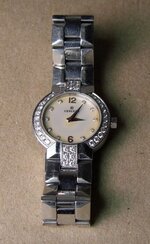MT DFX
Greenie
I live in Kalispell, MT, but get to California fairly often for work. When I am there I like to spend some time detecting at the beach. This summer was not very productive at the beaches I go to in north San Diego county, but this last trip made up for it and then some. On Friday afternoon after leaving work I drove down by the beach to visit some family I have there. They live close to the beach, so I drove along the coast to enjoy the views. On this particular Friday there was a very low tide with the water maybe 75 yards further out than usual. I had to give it a try. I quickly got my DFX set up and was detecting shortly before the sun went down. The recent tidal activity had pulled off a lot of sand, but I was not hitting many targets even so. I have a beach hunting program for my DFX that uses the all-metal mode (Audio Discrimination off) so there is little discrimination. I found a few clad coins and the usual small pile of old nails, melted aluminum cans, and pull-tabs. About an hour into the hunt I got a very strong signal in an area of the beach that would normally be under 3-4 feet or water. It pinpointed bigger than a coin or ring but I was digging everything, so I dug down about 3-4 inches and came up with a small women’s watch. It looked gaudy with lots of diamonds, but was made of stainless steel so I just thought it was another junk watch. I threw it in my bag and kept hunting.
When I got settled for the evening I cleaned the watch and saw that the brand name was “Concord” which did not mean anything to me. It was still running, but the time was set one hour ahead, so it had been under the sand and water at least since daylight savings ended. The back of the watch said it was made in Switzerland, so I decided to research it on line. When I identified the watch it turned out to be a very good one. It has a total of 44 clear white diamonds: 22 on the bezel, 12 on the lugs, and 10 on the mother of pearl face in place of the numbers. The list price was shown as an astounding $7,890.00. I was shocked of course, but also saddened by the thought of what someone must have felt like when they lost such a valuable piece of jewelry.
The day after I found it, I did some more research and found the web site for the manufacturer. I sent them an email asking if they could use the serial number I had found on the watch to identify the owner. A couple days later they replied that they were able to contact the dealer that had sold the watch. The dealer told them that someone had come in asking for a value, apparently for insurance purposes. If they can contact the owner they will let me know and I can try to return it.
Now for the moral dilemma in all of this (there always seems to be at least one when there is a significant amount of money involved). I am more than happy to give the watch back to its rightful owner because I believe it is the right thing to do, but if the owner has already been reimbursed for the loss by an insurance company then it seems to me that returning the watch without notifying the insurance company would be like me helping to defraud it. If anyone has any words of wisdom for me on this I would appreciate hearing them.
When I got settled for the evening I cleaned the watch and saw that the brand name was “Concord” which did not mean anything to me. It was still running, but the time was set one hour ahead, so it had been under the sand and water at least since daylight savings ended. The back of the watch said it was made in Switzerland, so I decided to research it on line. When I identified the watch it turned out to be a very good one. It has a total of 44 clear white diamonds: 22 on the bezel, 12 on the lugs, and 10 on the mother of pearl face in place of the numbers. The list price was shown as an astounding $7,890.00. I was shocked of course, but also saddened by the thought of what someone must have felt like when they lost such a valuable piece of jewelry.
The day after I found it, I did some more research and found the web site for the manufacturer. I sent them an email asking if they could use the serial number I had found on the watch to identify the owner. A couple days later they replied that they were able to contact the dealer that had sold the watch. The dealer told them that someone had come in asking for a value, apparently for insurance purposes. If they can contact the owner they will let me know and I can try to return it.
Now for the moral dilemma in all of this (there always seems to be at least one when there is a significant amount of money involved). I am more than happy to give the watch back to its rightful owner because I believe it is the right thing to do, but if the owner has already been reimbursed for the loss by an insurance company then it seems to me that returning the watch without notifying the insurance company would be like me helping to defraud it. If anyone has any words of wisdom for me on this I would appreciate hearing them.
Amazon Forum Fav 👍
Attachments
Upvote
0






